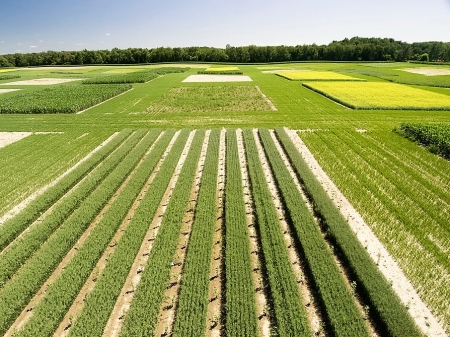Source: aginnovators.org.au
Published: July 11, 2016

Sault Paper Mill at sunset – two US PhD students have developed an eco-friendly agricultural use for lignin, the pulpy byproduct of biofuel and paper processing. Billy Wilson, Flickr CC
By Merran White
Biofuel production may save precious fossil fuels but it produces a lot of waste in the form of lignin, the pulpy, fibrous mass that’s left over once the plants have been processed.
As much as 70 percent of the material created by biofuel refining is lignin waste. And even more lignin is wasted in the production of paper.
Currently, the bulk of the waste from paper and biofuel production ends up in landfill or is burned as low-value fuel, with only about two percent of it being reused commercially.
Clearly, finding a productive use for all this wasted lignin pulp would benefit both the environment and processors’ profit margins.
Or so thought Tony Bova and Jeff Beegle, a couple of PhD students at The Bredesen Center for Interdisciplinary Research and Graduate Education, run jointly by the the University of Tennessee, Knoxville (UT) and Oak Ridge National Laboratory (ORNL).
In collaboration with ORNL’s Amrit Naskar, the pair developed a new process that enables them to convert lignin waste into fully biodegradable products with the potential to help farmers, crops and the planet.

Sustainable cellulosic biofuel production at Michigan State University’s W. K. Kellogg Biological Station: extracting oil from crops to make biofuels creates lignin as a byproduct, most of which is burnt or goes to landfill.
Great Lakes Bioenergy Research Center
Green waste to new growth: the new bioplastic mulch film
Bova and Beegle’s breakthrough was finding a viable way to convert lignin waste into biodegradable products for gardeners, greenhouse operators and crop farmers.
“Lignin is a naturally occurring product found in all trees and grasses that results in 50 million tons of waste a year in the paper industry alone,” Bova told Biomass magazine in April 2016.
“We have developed a process that allows us to make that lignin biodegradable and turn it into the large rolls of mulch film that farmers use to block weeds, retain moisture and soil temperature, and improve crop yield.”
Bova and Beegle’s Knoxville-based start-up, Grow Bioplastics, is developing new bioplastic mulch films for home gardeners, horticulturalists, greenhouse operators and crop farmers.
Why use biodegradable mulch films?
Mulch films (large-scale plastic ‘weed mats’) are increasingly popular among farmers – and with good reason, say Bova and Beevil, “because they are proven to improve crop yields by maintaining soil moisture content, regulating soil temperature, and preventing the growth of weeds”.
The problem is that farmers have to remove and dispose of these plastic films periodically, costing them time and money. Moreover, most of it ends up in local landfills.
Indeed, oil-based plastic mulch film amounts to around eight tons of plastic waste for every 100 acres of farmland – and as this type of film is used on an estimated two million-odd agricultural acres across the US, that’s a whopping 80,000 tons of plastic waste annually. The negative impact on the environment is far from negligible.
And getting rid of all this plastic isn’t cheap: Bova said farmers across the US spend as much as $300 per acre to dispose of the mulch film they currently use on crops.

Canola is one of several oilseed crops used to make biofuels. Bova and Beegle’s start-up Grow Bioplastics plans to turn the lignin waste from this process and from paper mills into biodegradable mulch films for agriculture.
Paul Godard, Flickr CC
TerraFilm Pro: an eco-friendly alternative
Grow Bioplastics’ clean, green alternative to oil-based plastic mulch films TerraFilm Pro is made from fully biodegradable lignin-pulp-based plastic. While it functions similarly to oil-based plastic mulch film, the new bioplastic film is designed to degrade in either six or 12 months, which means farmers can use it multiple times in a year to grow successive crops.
“Our product would be able to be ploughed into farmers’ soils after harvest, where it would degrade naturally and save them all of the money they currently spend on removal and disposal,” Bova said.
The woody pulp also acts as a soil conditioner once its role as a protective mat is over.
Bioplastic mulch film – gaining cred
The idea, it seems, is a win-win-win, with clear benefits for the paper and biofuels industries, growers, and the environment.
Already, Grow Bioplastics has won several awards in entrepreneurial and clean-tech competitions across the US for its new eco-friendly approach to lignin and plastic waste.
“If we have continued success, we’ll be looking to set up our own research and development lab soon and applying for Small Business Innovation Research grants to further fund our testing and product development,” Bova told Biomass.
Along with TerraFilm Pro, Grow Bioplastics has several other lignin-based products in development, including pots, trays and films, suitable for home gardeners, commercial greenhouse operators and farmers. All are biodegradable and are designed to replace their disposable oil-based plastic counterparts.
If all goes well, the team could begin field-testing prototypes of TerraFilm Pro as early as the Northern Hemisphere summer. They plan to conduct full-scale field trials of their biodegradable plastics on crops across Tennessee over the 2016 US spring.
“Everything is happening so fast, and we’re still working on finishing our PhDs,” said Bova, “but it’s all so exciting.”
For more information, visit the Grow Bioplastics website or Facebook page, or email Bova and Beegle on info@growbioplastics.co
SOURCE: University of Tennessee
